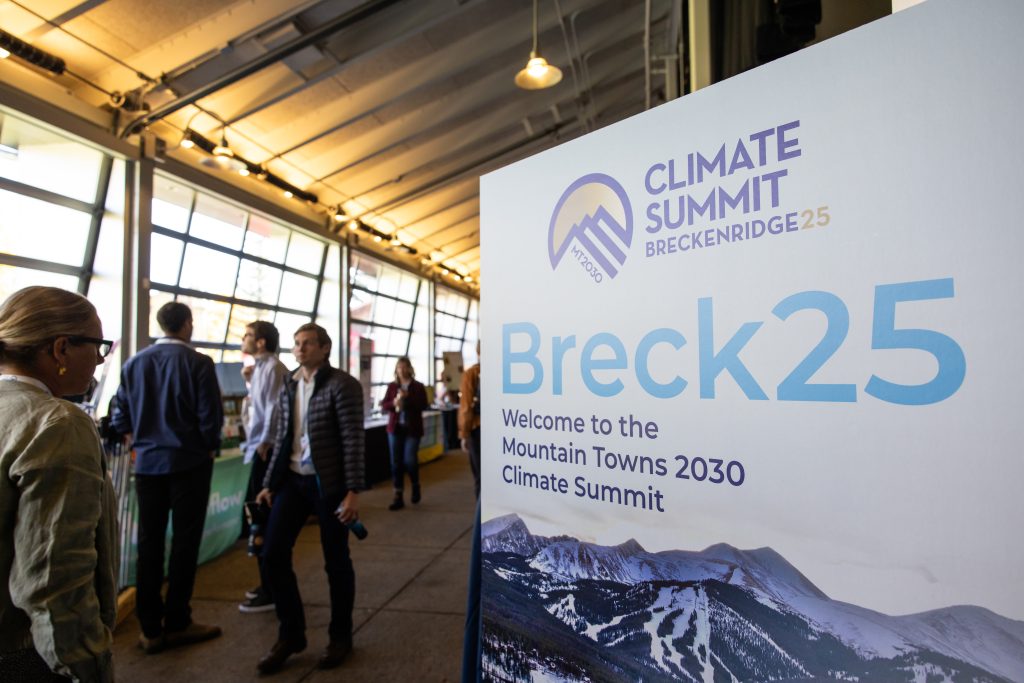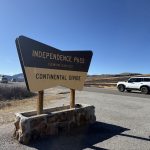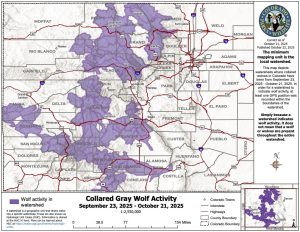Aspen leaders sign joint climate statement with 34 other mountain town reps
Roaring Fork Valley was well represented at the Mountain Towns 2030 Climate Summit

Courtesy photo
The Mountain Towns 2030 Climate Summit in Breckenridge this month saw Basalt Town Council Member and Aspen One Senior Sustainability and Philanthropy Manager Hannah Berman join Aspen Mayor Pro Tem John Doyle, Pitkin County Commissioner Francie Jacober, and 34 other elected leaders from mountain communities across the country to pledge to work together in the face of climate change.
Founded in 2019, the summit supports mountain, ski resort, and rural communities moving toward collective net-zero carbon emissions through collaboration, shared resources, and measurable action. The Oct. 8 summit hosted more than 600 leaders from 61 mountain communities and 37 ski resorts.
In a special meeting during the summit, 37 mountain town leaders signed a joint statement committing to working together to reduce emissions, transition to clean energy, and protect their communities’ natural environments that are on the front lines of climate change.
“Aspen has lost one month of winter since 1980 due to climate change — that’s a month hit to the sport that anchors our local economy and our way of life,” Berman told The Aspen Times in an email. “It’s also a financial issue because increasing wildfire risk has jacked up our home insurance premiums, not to mention the multi-million dollar cost of fighting wildfires.”
She remembered the 2018 Lake Christine Fire in Basalt that burned three homes, which included the home of a volunteer firefighter who was fighting the fire.
“Frankly, it’s not fair that our communities must shoulder the costs and impacts of increased wildfires and more erratic weather when the fossil fuel industry is responsible for causing that damage,” she said. “If a company dumped toxic waste into a river, they’d have to clean it up or pay into the superfund program. But thus far in Colorado, when climate change causes damage, that comes out of the pockets of local working families and government.”
The joint statement highlights shortened winters, vanishing snowpack, escalating wildfires, worsening drought, and flash floods as direct threats that “are no longer warnings of a distant future: they are here, they are now.” According to the statement, climate action is a necessity to support public health, local economies, and mountain landscapes.
The statement also underscores the need for local leaders to commit to climate action quickly as federal leaders “delay and deny.”
The statement continues, “Their inaction leaves us no choice but to lead … As elected leaders of mountain communities, we’re bonded by a deep love for our natural settings and an intense responsibility to protect them. Therefore, we pledge to work together to accelerate climate solutions at the local and regional level, building a nationwide subnational movement powerful enough to drive emissions to zero.”
For Berman, she noted that one of the reasons she ran for town council at 27 years old was because she felt the government wasn’t effectively addressing climate, an issue she stressed disproportionately impacts young people.
“So climate has always been a top priority for me, and it’s heartening to see local governments getting things done on building decarbonization, public transit, and clean energy,” she said.
The joint statement emphasizes speed as a critical piece of climate action in order to combat the growing risks. By sharing strategies, expertise, and data, the 37 leaders who signed the statement aim to ensure every community has the resources they need.
“Climate is a time sensitive issue, so unless we’re acting with urgency, we’re not solving the problem,” she said.
According to Berman, solving climate issues boils down to electrifying everything and ensuring that power comes from clean energy. She said that her biggest takeaway from the summit came from Holy Cross CEO Bryan Hannegan, who reinforced that Holy Cross is “racing” toward 100% clean energy and need local governments to make electrifying buildings and transit systems a priority.
“Buildings are two-thirds of our region’s carbon emissions and if new residential construction is all-electric, it will have no carbon impact by the time Holy Cross reaches 100% clean power,” Berman said. “That’s why I strongly support Basalt’s work to adopt an all-electric building code for new residential construction. Renovations are hard and expensive, which means we need to focus on building things right in the first place.”
For more information on the summit, visit mt2030.org.
Vroom vroom: Snowmobiles return to X Games Aspen after five-year hiatus
“It’s massive. My success at X Games in the past has shaped my life and my career and put it on a good path. Being given a global stage to be able to compete on and showcase our talents is huge,” said snowmobiler Brett Turcotte, an eight-time X Games medalist.










